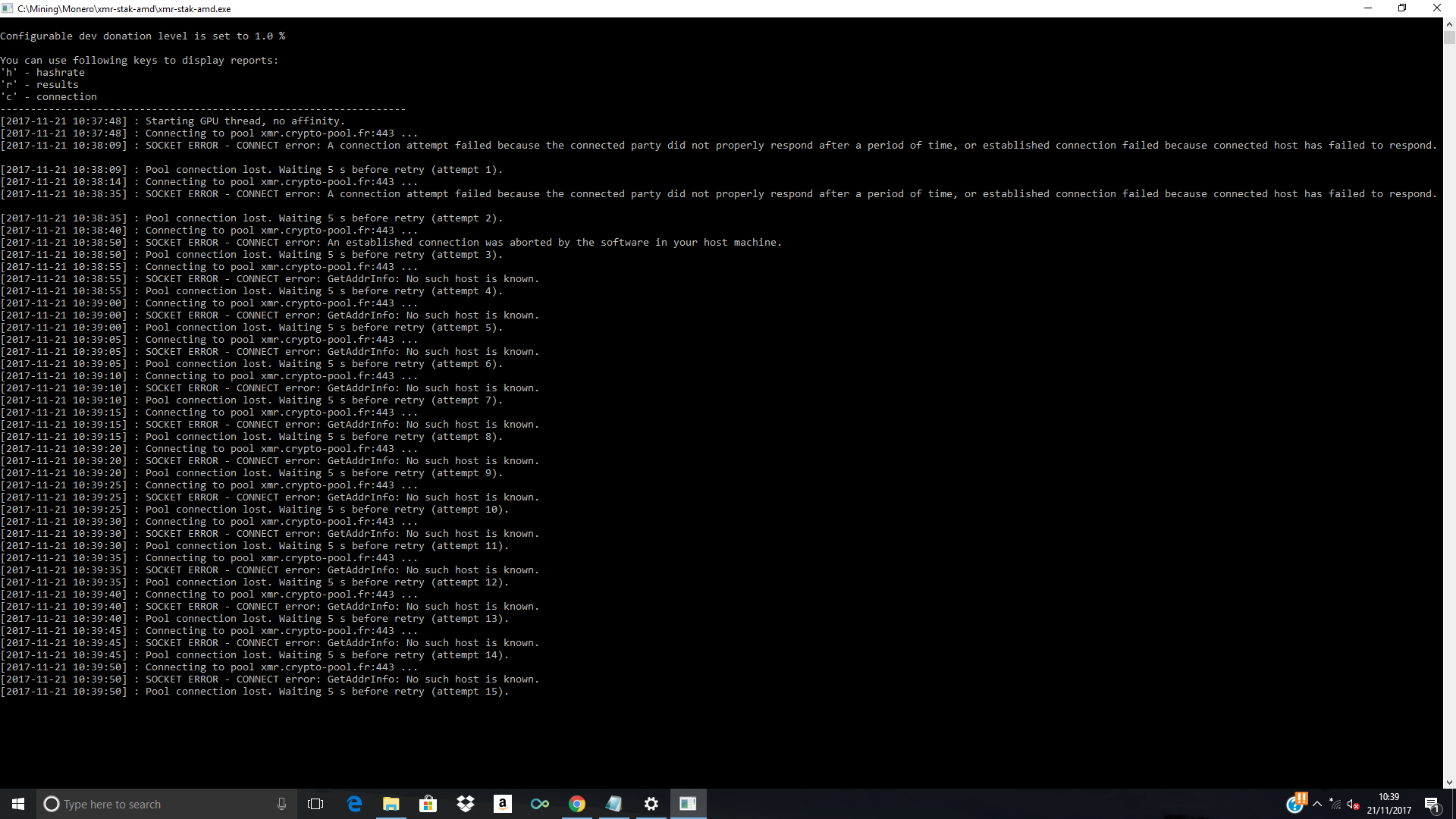xmr-stak-amd
 xmr-stak-amd copied to clipboard
xmr-stak-amd copied to clipboard
Socket Error - Connect Error
Hi there,
I keep getting the below:

I have tried to connect to port 443 and 80 in case it is a firewall issue but nothing works.
If I use XMR STAK CPU miner and connect to the same pool, I have no issues. It connects and starts to mine.
I have just started to get into mining and I am testing the waters so only using an AMD E2 8GB 2TB Desktop PC with AMD Radeon HD r2.
Any help please!
please post the file config.txt
Here you go:
/*
- Number of GPUs that you have in your system. Each GPU will get its own CPU thread. */ "gpu_thread_num" : 1,
/*
- GPU configuration. You should play around with intensity and worksize as the fastest settings will vary.
-
index - GPU index number usually starts from 0 - intensity - Number of parallel GPU threads (nothing to do with CPU threads)
- worksize - Number of local GPU threads (nothing to do with CPU threads)
- affine_to_cpu - This will affine the thread to a CPU. This can make a GPU miner play along nicer with a CPU miner. */ "gpu_threads_conf" : [ { "index" : 0, "intensity" : 500, "worksize" : 4, "affine_to_cpu" : false }, ],
/*
- Platform index. This will be 0 unless you have different OpenCL platform - eg. AMD and Intel. */ "platform_index" : 0,
/*
- TLS Settings
- If you need real security, make sure tls_secure_algo is enabled (otherwise MITM attack can downgrade encryption
- to trivially breakable stuff like DES and MD5), and verify the server's fingerprint through a trusted channel.
- use_tls - This option will make us connect using Transport Layer Security.
- tls_secure_algo - Use only secure algorithms. This will make us quit with an error if we can't negotiate a secure algo.
- tls_fingerprint - Server's SHA256 fingerprint. If this string is non-empty then we will check the server's cert against it. */ "use_tls" : false, "tls_secure_algo" : true, "tls_fingerprint" : "",
/*
- pool_address - Pool address should be in the form "pool.supportxmr.com:3333". Only stratum pools are supported.
- wallet_address - Your wallet, or pool login.
- pool_password - Can be empty in most cases or "x". */ "pool_address" : "xmr.crypto-pool.fr:443", "wallet_address" : "43d8TQwMZhX8Yu4TYCFefW5doCkTxsDthXhsbpqKkcwSLnwqFNEBBsCPaLEZEYak7PWtwy6QdteZGPNRr1zYPuCS33EnU55", "pool_password" : "",
/*
- Network timeouts.
- Because of the way this client is written it doesn't need to constantly talk (keep-alive) to the server to make
- sure it is there. We detect a buggy / overloaded server by the call timeout. The default values will be ok for
- nearly all cases. If they aren't the pool has most likely overload issues. Low call timeout values are preferable -
- long timeouts mean that we waste hashes on potentially stale jobs. Connection report will tell you how long the
- server usually takes to process our calls.
- call_timeout - How long should we wait for a response from the server before we assume it is dead and drop the connection.
- retry_time - How long should we wait before another connection attempt.
-
Both values are in seconds. - giveup_limit - Limit how many times we try to reconnect to the pool. Zero means no limit. Note that stak miners
-
don't mine while the connection is lost, so your computer's power usage goes down to idle.
*/ "call_timeout" : 30, "retry_time" : 5, "giveup_limit" : 0,
/*
- Output control.
- Since most people are used to miners printing all the time, that's what we do by default too. This is suboptimal
- really, since you cannot see errors under pages and pages of text and performance stats. Given that we have internal
- performance monitors, there is very little reason to spew out pages of text instead of concise reports.
- Press 'h' (hashrate), 'r' (results) or 'c' (connection) to print reports.
- verbose_level - 0 - Don't print anything.
-
1 - Print intro, connection event, disconnect event -
2 - All of level 1, and new job (block) event if the difficulty is different from the last job -
3 - All of level 1, and new job (block) event in all cases, result submission event. -
4 - All of level 3, and automatic hashrate report printing
*/ "verbose_level" : 3,
/*
- Automatic hashrate report
- h_print_time - How often, in seconds, should we print a hashrate report if verbose_level is set to 4.
-
This option has no effect if verbose_level is not 4.
*/ "h_print_time" : 60,
/*
- Daemon mode
- If you are running the process in the background and you don't need the keyboard reports, set this to true.
- This should solve the hashrate problems on some emulated terminals. */ "daemon_mode" : false,
/*
- Output file
- output_file - This option will log all output to a file.
*/ "output_file" : "",
/*
- Built-in web server
- I like checking my hashrate on my phone. Don't you?
- Keep in mind that you will need to set up port forwarding on your router if you want to access it from
- outside of your home network. Ports lower than 1024 on Linux systems will require root.
- httpd_port - Port we should listen on. Default, 0, will switch off the server. */ "httpd_port" : 0,
/*
- prefer_ipv4 - IPv6 preference. If the host is available on both IPv4 and IPv6 net, which one should be choose?
-
This setting will only be needed in 2020's. No need to worry about it now.
*/ "prefer_ipv4" : true,
I had this same issue, changed use_tls to 'true' and connected okay.